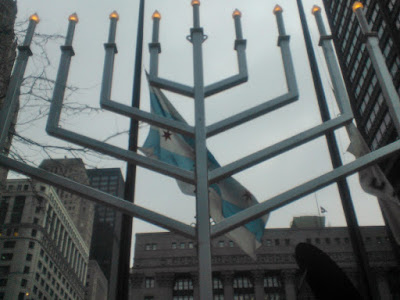 |
| Chicago's public menorah from five years ago can create split reactions, regardless of its actual intent. Photos by Gregory Tejeda |
I
DON’T ACTUALLY do that in part because it strikes me as tacky to use my
step-mother’s religious faith to score political partisan points against the nitwits
of our society. It would make me no better than those who want to use “Merry
Christmas” as a weapon.
I
bring this up because the Jewish holiday of Hanukkah actually began Tuesday
night and will continue into next week.
And
with my step-mother being Jewish (my father is a late-life convert), it means
the time of year to recall the survival of the Maccabees in the face of
elements of society that would just as soon have seen them exterminated is once
again upon us.
Now
in my own family, the little kids are growing up. So there’s not as much
pressure any more to indulge my nieces and nephews with lots of presents so
that they don’t feel cheated compared to their school friends for whom
Christmas is the thing!
 |
| Do people notice holiday decorations when passing through the airport en route to a sunnier locale? |
There
will be one night of various relatives coming over to the household for
something of a party – whose primary purpose it will seem like is consuming the
potato pancakes referred to as latkes.
Much of this, I’ll admit, is lost on me. I was baptized many decades ago by a Catholic priest and personally haven’t felt any need to change.
But
that isn’t held against me. I’m likely to be included in any celebration as we
recall the old story of how a Godly miracle enabled the Maccabees’ oil intended
to last one night actually kept their lamps lit for eight nights. |
| Gary, Ind., govt. brightens their chambers |
Much of this, I’ll admit, is lost on me. I was baptized many decades ago by a Catholic priest and personally haven’t felt any need to change.
THE
REASON WHY the menorahs include eight branches in their candelabrums – and why
a fully-lit menorah has the potential to be a fire hazard if the celebrants get
too clumsy.
All
of which has just enough of a solemn effect on me to refuse to use “Happy
Hanukkah” as a retort to the less-than-solemn “Merry Christmas” talk I have heard
in recent days. I’d like to think I’m better than those people who want to turn
the Christmas holiday and the birth of Christ that it celebrates into a weapon
touting the omnipresent existence of Trump that they’d like to impose on our
society.
Because
I know it would be the perfect retort in that it would force those ideologues
whose use of religious symbolism to tout their beliefs borders on being as
offensive as the Ku Klux Klan’s uses of the cross to tout their own racist
rants to have to acknowledge that theirs is NOT the only holiday in this winter
season.
While
I’ll be the first to admit that some of the efforts to equate Christmas, Hanukkah,
Kwanzaa (don’t forget the “aa” at the end) and whatever other festival one can
dream up do become absurd, I’ve never felt the need to tout my own thoughts
over everybody else’s.
LARGELY
BECAUSE I have viewed much of religious-inspired thought as a personal one. It
is something we ought to be celebrating internally.
There’s
nothing wrong with sharing. But feeling the need to force one’s thoughts or
celebration on others just seems wrong.
Just
as it can be confusing at times when someone feels the need to say “Merry
Christmas” to every single person they encounter. Are they just overly
cheerful? Or are they making a politically-partisan statement that requires a
retort?
Quite
honestly, I resent having to try to interpret every holiday greeting to figure out if the call for sharing and celebration is more intended as an excuse to act as society’s religious-motivated
bullies.
-30-
No comments:
Post a Comment